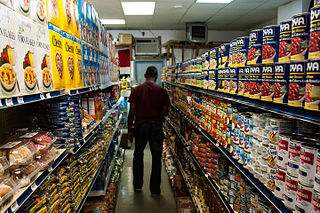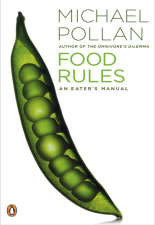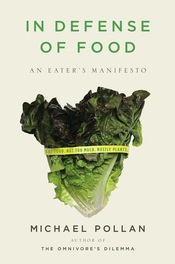
"Junk food" is a term used to describe food that is high in calories from sugar and/or fat, and possibly also sodium, but with little dietary fiber, protein, vitamins, minerals, or other important forms of nutritional value. It is also known as HFSS food. The term junk food is a pejorative dating back to the 1950s.

In nutrition, diet is the sum of food consumed by a person or other organism. The word diet often implies the use of specific intake of nutrition for health or weight-management reasons. Although humans are omnivores, each culture and each person holds some food preferences or some food taboos. This may be due to personal tastes or ethical reasons. Individual dietary choices may be more or less healthy.

A healthy diet is a diet that maintains or improves overall health. A healthy diet provides the body with essential nutrition: fluid, macronutrients such as protein, micronutrients such as vitamins, and adequate fibre and food energy.

Michael Kevin Pollan is an American author and journalist, who is currently the Knight Professor of Science and Environmental Journalism at the UC Berkeley Graduate School of Journalism.

Marion Nestle is an American academic. She was the Paulette Goddard professor of nutrition, food studies and public health at New York University. She was also a professor of Sociology at NYU and a visiting professor of nutritional sciences at Cornell University. Nestle's name is pronounced like the English verb "nestle", not like the name of the Swiss food conglomerate, to which she is unrelated.
Health at Every Size (HAES) is an approach to public health that seeks to de-emphasise weight loss as a health goal, and reduce stigma towards people who are overweight or obese. Proponents argue that traditional interventions focused on weight loss, such as dieting, do not reliably produce positive health outcomes, and that health is a result of lifestyle behaviors that can be performed independently of body weight. However, many criticize the approach and argue that weight loss should sometimes be an explicit goal of healthcare interventions, because of the negative health outcomes associated with obesity.

Meatless Monday is an international campaign that encourages people to not eat meat on Mondays to improve their health and the health of the planet.
Nutritionism is a paradigm that assumes that it is the scientifically identified nutrients in foods that determine the value of individual food stuffs in the diet. In other words, it is the idea that the nutritional value of a food is the sum of all its individual nutrients, vitamins, and other components. Another aspect of the term is the implication that the only point of eating is to promote bodily health. The term is largely pejorative, implying that this way of viewing food is simplistic and harmful, and the term is usually used to label others' views. The concept's most prominent proponent, and popularizer of the term, journalist and professor of journalism Michael Pollan, argues that a food's nutritional value is "more than the sum of its parts."

A food desert is an area that has limited access to affordable and nutritious food. In contrast, an area with greater access to supermarkets and vegetable shops with fresh foods may be called a food oasis. The designation considers the type and the quality of food available to the population, in addition to the accessibility of the food through the size and the proximity of the food stores.
Nutritional rating systems are used to communicate the nutritional value of food in a more-simplified manner, with a ranking, than nutrition facts labels. A system may be targeted at a specific audience. Rating systems have been developed by governments, non-profit organizations, private institutions, and companies. Common methods include point systems to rank foods based on general nutritional value or ratings for specific food attributes, such as cholesterol content. Graphics and symbols may be used to communicate the nutritional values to the target audience.

Bryant Terry is an African-American vegan chef, food justice activist, and author. He has written four vegan cookbooks and cowrote a book about organic eating. He won a 2015 James Beard Foundation Leadership Award for his food justice work. In 2021 he was awarded a NAACP Image Award for his book Vegetable Kingdom, which received a starred review from Publishers Weekly.
Jane Ellen Brody is an American journalist principally covering science and nutrition. She wrote for The New York Times as its weekly "Personal Health" columnist from 1976 to 2022. Her column was syndicated nationwide, and she wrote several books on health. She was called the "High Priestess of Health" by Time magazine in 2008.
Food studies is the critical examination of food and its contexts within science, art, history, society, and other fields. It is distinctive from other food-related areas of study such as nutrition, agriculture, gastronomy, and culinary arts in that it tends to look beyond the consumption, production, and aesthetic appreciation of food and tries to illuminate food as it relates to a vast number of academic fields. It is thus a field that involves and attracts philosophers, historians, scientists, literary scholars, sociologists, art historians, anthropologists, and others.

Food Rules: An Eater's Manual is a 2009 book by Michael Pollan. It offers 64 rules on eating based on his previous book In Defense of Food in three sections: Eat food, mostly plants, not too much. The book attributes the "diseases of affluence", to the so-called "Western Diet" of processed meats and food products, and offers its rules as a remedy to the problem.

Michael Herschel Greger is an American physician, author, and professional speaker on public health issues, best known for his advocacy of a whole-food, plant-based diet, and his opposition to animal-derived food products.

MyPlate is the current nutrition guide published by the USDA's Center for Nutrition Policy and Promotion, and serves as a recommendation based on the Dietary Guidelines for Americans. It replaced the USDA's MyPyramid guide on June 2, 2011, ending 19 years of USDA food pyramid diagrams. MyPlate is displayed on food packaging and used in nutrition education in the United States. The graphic depicts a place setting with a plate and glass divided into five food groups that are recommended parts of a healthy diet. This dietary recommendation combines an organized amount of fruits, vegetables, grains, protein, and dairy. It is designed as a guideline for Americans to base their plate around in order to make the educated food choices. ChooseMyPlate.gov shows individuals the variety of these 5 subgroups based on their activity levels and personal characteristics.

Monica Reinagel is a nutritionist based in Baltimore, United States.
Adam Drewnowski is a professor of epidemiology at the University of Washington and the director of the Center for Public Health Nutrition at the University's School of Public Health. Son of an economics professor Jan Drewnowski.
A monotrophic diet is a type of diet that involves eating only one food item or one type of food. Monotrophic diets may be followed for food faddism motives, as a form of crash dieting, to initiate an elimination diet or to practice an extreme form of alternative medicine.
The James Beard Foundation Awards are annual awards presented by the James Beard Foundation to recognize culinary professionals in the United States. The awards recognize chefs, restaurateurs, authors and journalists each year, and are generally scheduled around James Beard's May birthday.












